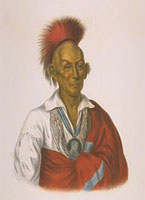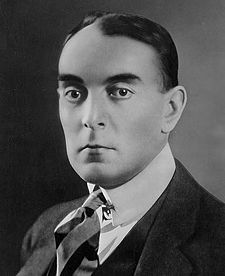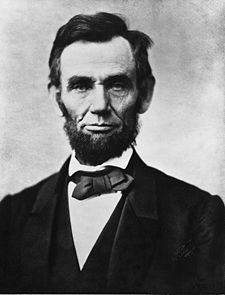
Vivian Gussin Paley
Born: 1929 in Chicago, Illinois
Pen Name: None Connection to Illinois: Taught and lived in Chicago for 37 years. Biography: Vivian Paley taught preschool children for 37 years, much of that time at the University of Chicago's Laboratory Schools. She is the only Kindergarten teacher to ever receive one of the MacArthur 'genius' grants. In addition to teaching, Paley has written more than 10 books about life in the classroom.
Awards:
- NCTE David H. Russell Award,1999. John Dewey Society`s Outstanding Achievement Award, 2000 Erickson Institute Award, 1987.
Selected Titles
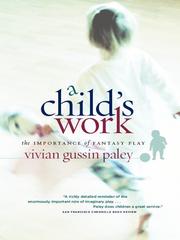 |
A child's work : ISBN: 9780226644981 OCLC: 659807008 University of Chicago Press, Chicago : 2004. A Child's Work goes inside classrooms around the globe to explore the stunningly original language of children in their role-playing and storytelling. Drawing from their own words, Paley examines how this natural mode of learning allows children to construct meaning in their worlds, meaning that carries through into their adult lives. Proof that play is the work of children, this compelling and enchanting book will inspire and instruct teachers and parents as well as point to a fundamental misdirection in today's educational programs and strategies.--Jacket. |
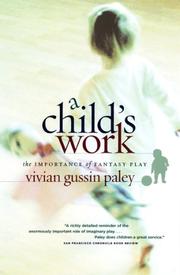 |
A child's work : ISBN: 0226644898 OCLC: 53145450 University of Chicago Press, Chicago : 2004. "A Child's Work goes inside classrooms around the globe to explore the stunningly original language of children in their role-playing and storytelling. Drawing from their own words, Paley examines how this natural mode of learning allows children to construct meaning in their worlds, meaning that carries through into their adult lives. Proof that play is the work of children, this compelling and enchanting book will inspire and instruct teachers and parents as well as point to a fundamental misdirection in today's educational programs and strategies."--Jacket. |
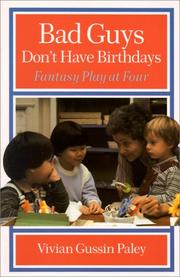 |
Bad guys don't have birthdays : ISBN: 0226644960 OCLC: 16646393 University of Chicago Press, Chicago : ©1988. Publisher's description: Bad guys are not allowed to have birthdays, pick blueberries, or disturb the baby. So say the four-year-olds who announce life's risks and dangers as they play out the school year in Vivian Paley's classroom. Their play is filled with warnings. They invent chaos in order to show that everything is under control. They portray fear to prove that it can be conquered. No theme is too large or too small for their intense scrutiny. Fantasy play is their ever dependable pathway to knowledge and certainty. |
| Boys & girls : ISBN: 9780226130101 OCLC: 858778270 In this book, Vivian Paley has re-created a year of kindergarten teaching in which she explored the differences in the ways children play and fantasize. Each year, swords and purses in hand, the children rush to proclaim themselves boys or girls. Watching the Cinderellas and Darth Vaders pursue their separate fantasies, Paley questions the cliches and prejudices of the teacher's curriculum that reward girls' domestic play while discouraging boys' adventurous fantasies. The children's own conversations, stories, playacting, and scuffles are interwoven with Paley's observations and accounts of her attempts to alter the children's stereotyped play. Their search for self-definition will reawaken our own childhood memories, and Paley's sensitive efforts to uncover her prejudices will illuminate our own biases, values, and expectations for our children. |
|
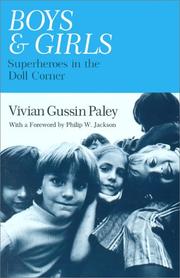 |
Boys & girls : ISBN: 0226644928 OCLC: 10432466 University of Chicago Press, Chicago : 1984. In this book, Vivian Paley has re-created a year of kindergarten teaching in which she explored the differences in the ways children play and fantasize. Each year, swords and purses in hand, the children rush to proclaim themselves boys or girls. Watching the Cinderellas and Darth Vaders pursue their separate fantasies, Paley questions the cliches and prejudices of the teacher's curriculum that reward girls' domestic play while discouraging boys' adventurous fantasies. The children's own conversations, stories, playacting, and scuffles are interwoven with Paley's observations and accounts of her attempts to alter the children's stereotyped play. Their search for self-definition will reawaken our own childhood memories, and Paley's sensitive efforts to uncover her prejudices will illuminate our own biases, values, and expectations for our children. |
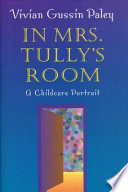 |
In Mrs. Tully's room : ISBN: 9780674041882 OCLC: 456238222 Harvard University Press, Cambridge, Mass. : 2001. |
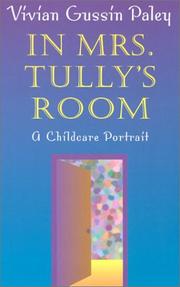 |
In Mrs. Tully's room : ISBN: 0674011163 OCLC: 46240243 Harvard University Press, Cambridge, Mass. : 2001. "Watching two-year-old Alex and his toddler classmates act out his one-word "Mama" story, and hearing their teacher muse, "Seems like the best reason to tell a story, when you are two, is to keep Mama in mind, ' Vivian Paley found herself drawn into a remarkable childcare center. In Mrs. Tully's Room tells the story of the comforting and compelling community created by the center's gifted director." "In joining Paley on her many visits to this extraordinary center, readers see how childcare providers combine teaching ability and emotional responsiveness to help even the smallest children learn words, concepts, stories, and the management of their emotions. Mrs. Tully's memories of her own childhood enrich her ability to understand her two-, three-, four-, and five-year-olds and to draw them into the world of expressive storytelling."--Jacket. |
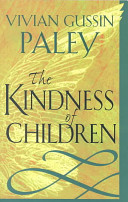 |
Kindness of children. ISBN: 067400390X OCLC: 141382065 Harvard Univ Press, Cambridge : 2000. |
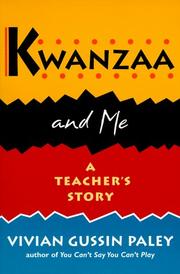 |
Kwanzaa and me : ISBN: 0674505867 OCLC: 30624290 Harvard University Press, Cambridge, Mass. : 1995. All these white schools I've been sent to are racist," Sonya says. "I'd have done better in a black school. I was an outsider here." These are hard words for Vivian Paley, whose own kindergarten was one of Sonya's schools, the integrated classroom so lovingly and hopefully depicted by Paley in White Teacher. Confronted with the grown-up Sonya, now on her way to a black college, and with a chorus of voices questioning the fairness and effectiveness of integrated education, Paley sets out to discover the truth about the multicultural classroom from those who participate in it. |
| Mollie is three : ISBN: 0226644936 OCLC: 12808500 University of Chicago Press, Chicago : 1986. |
|
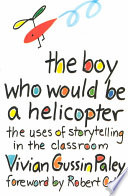 |
The boy who would be a helicopter / ISBN: 0674080319 OCLC: 20629630 Harvard University Press, Cambridge, Mass. : 1990. Documents a child's journey from isolation to connection and safety in a preschool classroom. |
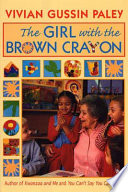 |
The girl with the brown crayon ISBN: 9780674041837 OCLC: 438802092 Harvard University Press, Cambridge, Mass. : 1997. Once again Vivian Paley takes us into the inquiring minds and dramatic worlds of young children learning in the kindergarten classroom. As she enters her final year of teaching, Paley tells in this book a story of farewell and a story of self-discovery - through the thoughts and blossoming spirit of Reeny, a little girl with a fondness for the color brown and an astonishing sense of herself, This brown girl that's dancing is me, Reeny announces as her crayoned figures. |
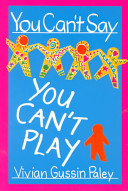 |
You can't say you can't play ISBN: 9780674965904 OCLC: 25131301 Harvard University Press, Cambridge, Mass. : 1992. Publisher's description: Who of us cannot remember the pain and humiliation of being rejected by our classmates? However thick-skinned or immune to such assaults we may become as adults, the memory of those early exclusions is as palpable to each of us today as it is common to human experience. We remember the uncertainty of separating from our home and entering school as strangers and, more than the relief of making friends, we recall the cruel moments of our own isolation as well as those children we knew were destined to remain strangers. In this book Vivian Paley employs a unique strategy to probe the moral dimensions of the classroom. She departs from her previous work by extending her analysis to children through the fifth grade, all the while weaving remarkable fairy tale into her narrative description. Paley introduces a new rule-You can't say you can't play--To her kindergarten classroom and solicits the opinions of older children regarding the fairness of such a rule. We hear from those who are rejected as well as those who do the rejecting. One child, objecting to the rule, says, It will be fairer, but how are we going to have any fun? Another child defends the principle of classroom bosses as a more benign way of excluding the unwanted. In a brilliant twist, Paley mixes fantasy and reality, and introduces a new voice into the debate: Magpie, a magical bird, who brings lonely people to a place where a full share of the sun is rightfully theirs. Myth and morality begin to proclaim the same message and the schoolhouse will be the crucible in which the new order is tried. A struggle ensues and even the Magpie stories cannot avoid the scrutiny of this merciless pack of social philosophers who will not be easily caught in a morality tale. You Can't Say You Can't Play speaks to some of our most deeply held beliefs. Is exclusivity part of human nature? Can we legislate fairness and still nurture creativity and individuality? Can children be freed from the habit of rejection? These are some of the questions. The answers are to be found in the words of Paley's schoolchildren and in the wisdom of their teacher who respectfully listens to them. |


